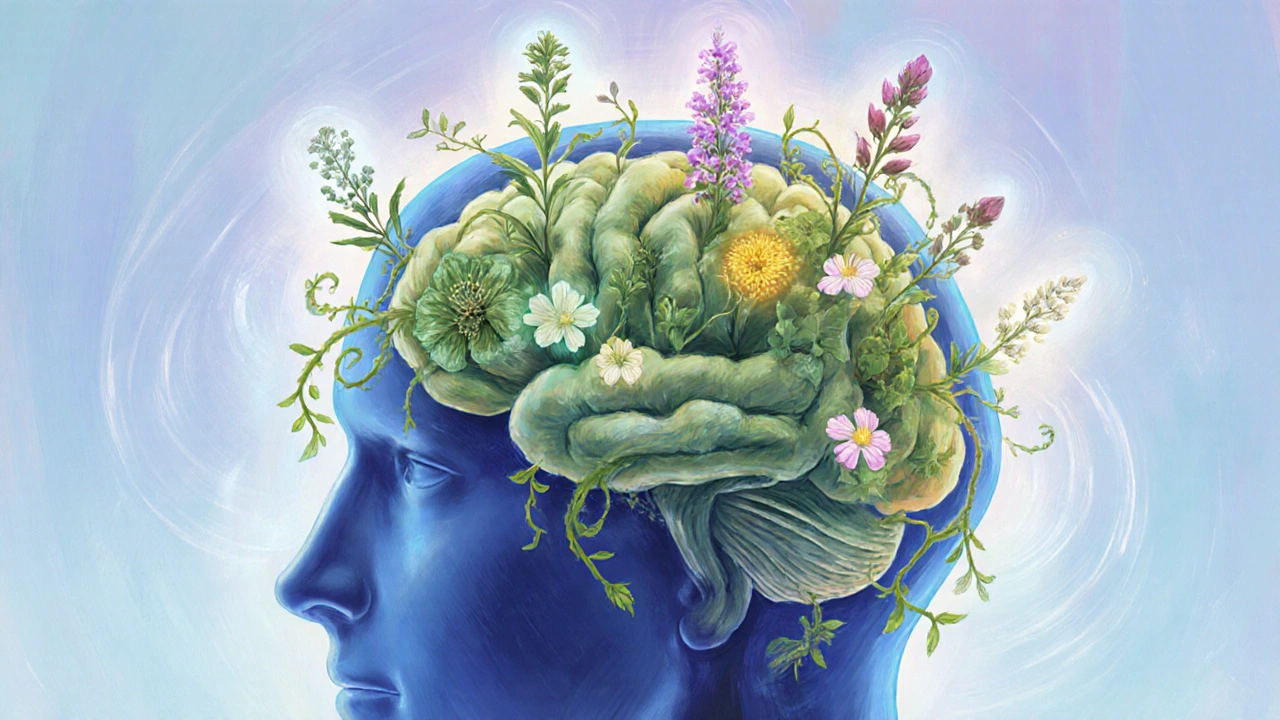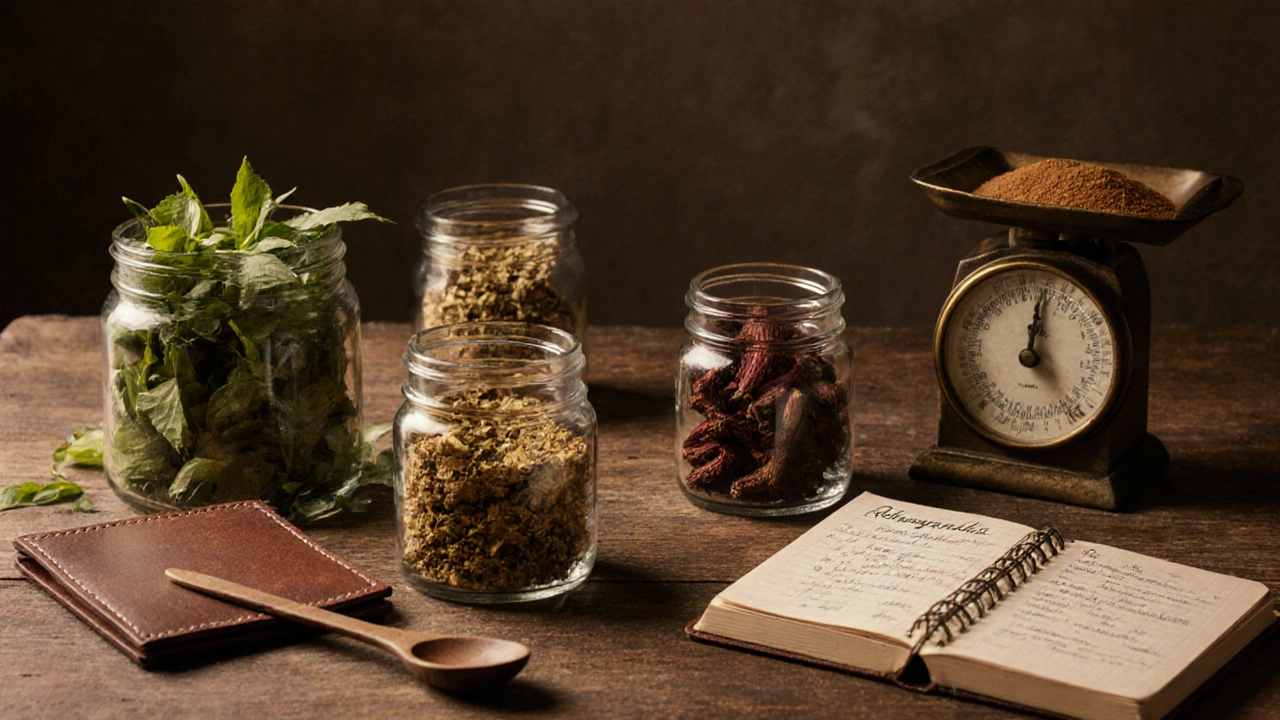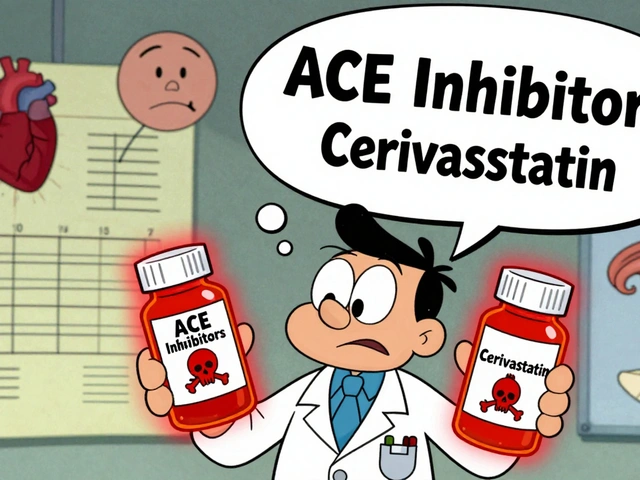Nootropic Herb Selector
Choose Your Cognitive Goal
Desired Onset Time
Health Considerations
Recommended Herb
When you start hunting for a natural brain‑boost, Brahmi versus alternatives is the question that pops up. The market is flooded with herbs promising sharper memory, calmer focus, and less mental fog. This guide breaks down the most talked‑about options, shows how they stack up, and gives you a clear path to pick the right one for your brain goals.
Quick Take
- Brahmi (Bacopa monnieri) shines for memory consolidation and long‑term learning.
- Ginkgo biloba improves blood flow and works best for age‑related cognition.
- Rhodiola rosea excels at stress resilience and mental stamina.
- Ashwagandha calms anxiety while supporting overall cognition.
- Lion’s Mane and Gotu Kola are great for neuro‑growth and gentle focus.
What Is Brahmi?
Brahmi is a common name for Bacopa monnieri, an evergreen herb native to the wetlands of India and Southeast Asia. Traditionally used in Ayurvedic medicine, Brahmi has been dubbed the “herb of memory” because early studies linked it to improved recall and learning speed. The plant contains a group of saponins called bacosides, which are believed to protect neurons, enhance synaptic communication, and boost the production of certain brain‑derived neurotrophic factors (BDNF).
How Does Brahmi Work?
The bacosides act like a tiny maintenance crew for your brain cells. They help repair damaged dendrites, increase the rate at which neurons fire, and reduce oxidative stress. In practical terms, users often notice a smoother transition from learning new material to remembering it weeks later. The effect isn’t instant; most clinical trials show noticeable gains after 8‑12 weeks of consistent dosing (usually 300‑450mg of standardized extract per day).
Key Alternatives Overview
Below are the main contenders that people compare with Brahmi. Each offers a slightly different angle on cognitive support.
Ginkgo biloba is a leaf‑extract herb prized for its ability to improve cerebral blood flow and act as an antioxidant.
Rhodiola rosea is an adaptogenic root that helps the body cope with physical and mental stress, thereby preserving mental energy.
Ashwagandha (Withania somnifera) is another adaptogen known for reducing cortisol levels and supporting calm focus.
Gotu Kola (Centella asiatica) shares some overlap with Brahmi but is more widely used for micro‑circulation and skin health.
Lion’s Mane (Hericium erinaceus) is a medicinal mushroom that stimulates nerve‑growth factor production, aiding neuro‑plasticity.
Panax ginseng is a root that boosts mental stamina and can counteract fatigue, especially in high‑pressure environments.

Side‑by‑Side Comparison
| Herb | Active Compounds | Primary Cognitive Benefit | Typical Dosage | Onset Time | Evidence Level* |
|---|---|---|---|---|---|
| Brahmi (Bacopa monnieri) | Bacosides A & B | Memory consolidation, learning speed | 300‑450mg standardized extract (20‑55% bacosides) | 8‑12 weeks | Strong (multiple RCTs) |
| Ginkgo biloba | Flavonol glycosides, terpenoids | Blood‑flow, age‑related cognition | 120‑240mg daily (standardized 24% flavonoids, 6% terpenes) | 2‑4 weeks | Moderate (mixed results) |
| Rhodiola rosea | Rosavins, salidroside | Stress resilience, mental stamina | 200‑400mg (standardized 3‑5% rosavins) | 1‑2 weeks | Good (several double‑blind studies) |
| Ashwagandha | Withanolides | Anxiety reduction, calm focus | 300‑600mg (standardized 5‑10% withanolides) | 3‑6 weeks | Strong (meta‑analyses on stress) |
| Gotu Kola (Centella asiatica) | Triterpenoids, asiaticoside | Micro‑circulation, mild cognition | 500‑1000mg dried leaf | 4‑6 weeks | Limited (small trials) |
| Lion’s Mane | Hericenones, erinacines | Neuro‑plasticity, mild memory boost | 500‑3000mg extract | 4‑8 weeks | Emerging (few RCTs) |
| Panax ginseng | Ginsenosides | Energy, mental endurance | 200‑400mg standardized extract | 2‑4 weeks | Moderate (some RCTs) |
Choosing the Right Herb for You
Think of each herb as a tool in a mental‑health toolbox. Ask yourself three questions:
- What’s my main goal? If you need long‑term memory gains, Brahmi’s bacosides are hard to beat. For fast‑acting focus during a stressful deadline, Rhodiola or Ginseng may feel more immediate.
- How quickly do I want results? Herbs like Ginkgo and Rhodiola show benefits within weeks, whereas Brahmi and Lion’s Mane need a couple of months of consistent use.
- Do I have any health concerns? People on blood thinners should be cautious with Ginkgo. Those with thyroid issues should watch Ashwagandha dosages.
Stacking is tempting, but start with a single herb for at least 6 weeks to gauge tolerance before mixing. Most users find a single, well‑chosen supplement works just fine.
Safety, Side Effects, and Interactions
All the herbs listed are generally safe for healthy adults when taken at recommended levels. Common mild side effects include digestive upset (Brahmi, Ashwagandha), headache (Ginkgo), or jitteriness (high‑dose Rhodiola). Always check with a healthcare professional if you’re pregnant, nursing, or on prescription meds.
Key interaction notes:
- Ginkgo biloba can amplify the effect of anticoagulants like warfarin.
- Rhodiola may interact with antidepressants, potentially leading to serotonin syndrome.
- Ashwagandha can lower blood sugar, so diabetics should monitor levels.
For Brahmi, the biggest caution is the need for a loading period; abrupt high doses may cause nausea. Splitting the dose across the day often mitigates this.
Practical Tips for Getting the Most Out of Your Herb
- Take Brahmi with a meal containing healthy fats - the bacosides are fat‑soluble.
- Pair Ginkgo with vitamin C to support its antioxidant pathway.
- Use Rhodiola in the morning; it can be mildly stimulating.
- Combine Ashwagandha with a calming bedtime routine for best sleep benefits.
- Consume Lion’s Mane in coffee or tea; the heat helps extract the erinacines.
Frequently Asked Questions
Can I take Brahmi and Ginkgo together?
Yes, they target different mechanisms - Brahmi works on memory consolidation while Ginkgo improves blood flow. Start with low doses and monitor for any stomach upset.
How long does it take to feel the effects of Brahmi?
Most people report noticeable changes after 8‑12 weeks of daily use. Early benefits like reduced anxiety may appear sooner, around 3‑4 weeks.
Is Brahmi safe for children?
Clinical data on kids is limited. Pediatric use should only be considered under a doctor’s supervision, typically at very low doses.
Which herb is best for stress‑related brain fog?
Rhodiola rosea and Ashwagandha are top choices for stress‑induced fog because they lower cortisol and support energy without a crash.
Do I need to cycle off Brahmi?
A typical cycle is 8‑12 weeks on, followed by a 2‑week break. This helps prevent tolerance and keeps the brain responsive.




